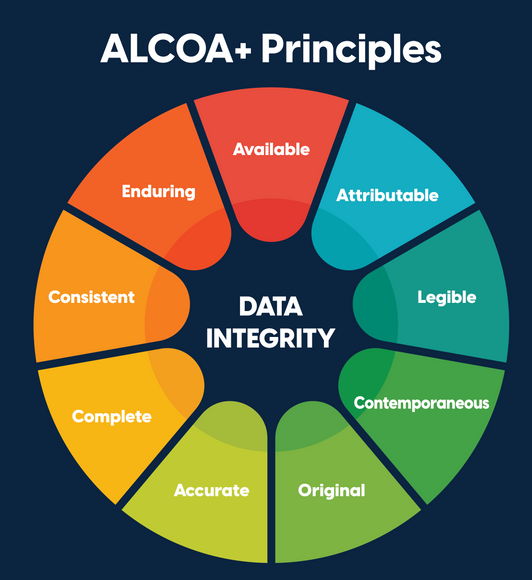ALCOA Principles in Life Sciences and Pharmaceutical Production

What Are ALCOA Principles?
The ALCOA principles are a set of guidelines designed to ensure data integrity. ALCOA stands for Attributable, Legible, Contemporaneous, Original, and Accurate. These principles were initially developed by the U.S. Food and Drug Administration (FDA) and have since been adopted globally.
Data integrity is crucial in the life sciences and pharmaceutical industries. Ensuring the accuracy, reliability, and consistency of data is not just a regulatory requirement but also fundamental to patient safety and product quality. This is where the ALCOA principles come into play and where our AuditSafe software can help you.
The Five Core ALCOA Principles
Attributable
Data should be traceable to the person who generated it. This ensures accountability and transparency. In our AuditSafe software this is ensured by secure logins to identify each user and attribute data collection and analysis to them.
Legible
Data should be clear and readable. Legibility ensures that data can be easily understood and verified. Our AuditSafe software allows the export of human readable audit trails and reports.
Contemporaneous
Data should be recorded at the time it is generated. This ensures that the data reflects the actual situation accurately. Our AuditSafe software timestamps every project whenever it is interacted with.
Original
Data should be the original record or a certified true copy. Authenticity is crucial for data integrity. AuditSafe allows users to validate projects or reports to ensure authenticity.
Accurate
Data should be correct and free from errors. Accuracy ensures the reliability of data.
Extended ALCOA+ Principles
Over time, additional principles have been added to the ALCOA framework, leading to ALCOA+. These include Complete, Consistent, Enduring, and Available.
Complete
All data should be recorded, ensuring no omissions.
Consistent
Data should be recorded in a consistent manner across all records.
Enduring
Data should be preserved for the required period.
Available
Data should be accessible whenever needed for review.

Importance of ALCOA Principles in Life Sciences
Ensuring Data Integrity
These principles help maintain the integrity of data, which is critical for making informed decisions based on data you can trust.
Regulatory Compliance
Adhering to the principles is essential for compliance with regulatory bodies like the FDA and EMA to get your therapeutic product approved for use when the time comes.

Application of ALCOA in Pharmaceutical Production
Data Collection and Recording
Implementing ALCOA principles during data collection ensures the accuracy and reliability of data.
Data Storage and Retrieval
Proper data storage and retrieval practices are essential for maintaining data integrity.
Attributable: Ownership and Accountability
Importance of Attribution
Attribution ensures that data can be traced back to the individual who generated it, promoting accountability.
Methods to Ensure Attributable Data
Using unique identifiers and electronic signatures can help ensure data is attributable.
Legible: Clarity and Readability
Significance of Legibility
Legible data is easier to understand, verify, and audit.
Best Practices for Maintaining Legible Records
Standardized forms and clear handwriting or digital entries ensure legibility.
Contemporaneous: Timeliness of Data Recording
The Need for Real-Time Data Entry
Recording data in real-time ensures it reflects the actual conditions and events.
Strategies to Achieve Contemporaneous Documentation
Implementing electronic data capture systems can help achieve contemporaneous documentation.
Original: Authenticity of Data
Defining Original Data
Original data refers to the initial record of an observation or activity.
Techniques to Preserve Original Data
Using validated systems and maintaining audit trails can help preserve the originality of data.
Accurate: Precision and Correctness
Ensuring Data Accuracy
Regular audits and validation checks can help ensure data accuracy.
Tools and Technologies to Maintain Accuracy
Using automated systems and software can enhance data accuracy.
ALCOA+ Complete: Comprehensive Data
Importance of Completeness
Complete data ensures that all relevant information is available for decision-making.
Ensuring Data is Complete
Regular reviews and audits can help ensure data completeness.
Consistent: Uniformity in Data
Need for Consistency
Consistent data allows for reliable comparisons and trend analysis.
Methods to Maintain Consistency
Standard operating procedures (SOPs) and training can help maintain consistency.
Enduring: Long-term Data Preservation
Significance of Data Endurance
Enduring data ensures that information is available for the required duration.
Approaches for Ensuring Enduring Records
Using durable storage media and regular backups can ensure data endurance.
Available: Accessibility of Data
Ensuring Data Availability
Data should be readily accessible to authorized personnel whenever needed.
Solutions for Data Access and Retrieval
Implementing robust data management systems can ensure data availability.
Challenges in Implementing ALCOA Principles
Common Obstacles
Challenges include resistance to change, lack of training, and technological limitations.
Strategies to Overcome Challenges
Providing training, using user-friendly technologies, and fostering a culture of compliance can help overcome these challenges.
Conclusion
The ALCOA principles are fundamental to ensuring data integrity in the life sciences and pharmaceutical industries. By adhering to these principles, organizations can ensure the reliability and accuracy of their data, which is essential for regulatory compliance and patient safety.
FAQs
What are ALCOA principles?
ALCOA principles are guidelines to ensure data integrity, standing for Attributable, Legible, Contemporaneous, Original, and Accurate.
Why are ALCOA principles important in pharmaceutical production?
They ensure the accuracy, reliability, and integrity of data, which is crucial for regulatory compliance and patient safety.
How do ALCOA principles ensure data integrity?
By providing a framework for data management that ensures data is traceable, clear, timely, authentic, and correct.
What is the difference between ALCOA and ALCOA+ principles?
ALCOA+ includes additional principles: Complete, Consistent, Enduring, and Available, to further ensure data integrity.
How can companies implement ALCOA principles effectively?
By providing training, using validated systems (like our AuditSafe software), and fostering a culture of compliance and accountability.
